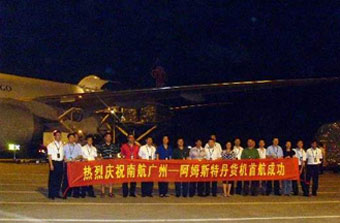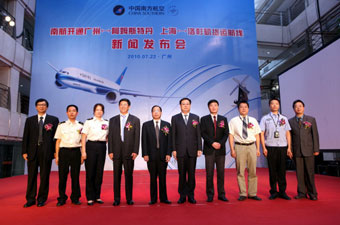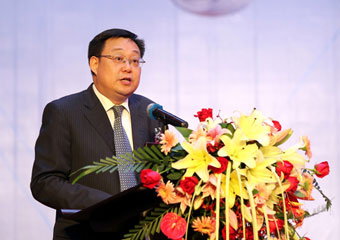|

Über Lawyer Targets Cargo
Here are a couple of headlines to get you
in the mood:
July 2004
ACN/Flying Typers – “Air Cargo Price Fix Flap Widens”
June 2006
ACN/Flying Typers – “Price Fixing Probe Expands”
June, 2008
ACN/Flying Typers – “Price Fixing”
These are merely samples of a dozen and
more articles in which we reported about this sordid post 9/11 affair
that just won’t go away. Let’s look at a couple of updates
elsewhere:
July 2009 – “Canada fines Qantas over air cargo
price-fix scheme” [Vancouver Sun]
July 2010 –
“AA Pays $5 Million to Settle Cargo Price-Fixing Suit” [JOC]
July 2010
– “Delta fined $38M for Northwest cargo price-fixing”
[TheSunNews - AP]
July 2010
– “Air France-KLM Settles its US Air Cargo Cartel Claims for
$87M….”
The last one is not from the press, but
rather from the Washington, D.C. “Super Lawyer’s” [2007,
08, 09 and 2010] web site that goes by a number of monikers – “US
class action star,” “class actioneer” and “Globetrotting
Hausfeld.” Overlawyered.com called him “lawsuit impresario”
and reported back in 2005 that he has embarked on “a crusade to
export America’s legal system around the world.” Are we blessed
or what?
His interests are diverse and span the globe
– from a landmark apartheid reparations case in South Africa against
several international corporations, including Daimler AG, General Motors,
Ford Motor Company and IBM, to a cartel of egg producers and processed
egg products antitrust litigation. The former seeks more than $400 billion
from those companies while the latter settled for a meager $25 million.
The London Times noted in 2007 that “in American corporate
boardrooms, the mere mention of the name Michael Hausfeld is enough to
spread panic among directors and investors!”
Seen in that light, the political contributions
list of $16,234 for 2008, exclusively to democrats, ranging from John
Edwards to Senator Obama and Senator Biden (who got the most funding),
puts in context some of the commentary published on overlawyered.com regarding
the destructiveness of the current legal system – to quote (regarding,
in particular, the South Africa suit):
“the lawsuits will do victims of wrongdoing
little or no good”; “they will penalize no human being who
has done anything wrong”; “they will deter more conduct that
is beneficial than harmful”; “the legal costs and any damage
will come at the expense of the general public” and lastly “the
lawsuits therefore serve no purpose at all but to enrich lawyers and provide
ideological power trips for some judges as well as lawyers,” wrote
Stuart Taylor, Jr., a columnist for National Journal, as well
as contributing editor at Newsweek and a nonresident senior fellow
in governance studies at the Brookings Institution. He is also a graduate
of Princeton University and Harvard Law School.
So what can we make of what has been formally
called an “international price fixing cartel” by the US DOJ?
As previously reported and well publicized, airlines have been accused
of unlawfully conspiring to fix prices and surcharges for freight transportation.
To be absolutely clear, there is no way anyone can condone, minimize or
excuse illegal commercial behavior or misinterpret what we are trying
hard to put in some context here. Allegedly, according to federal authorities,
fines totaling about $1.5 billion – “…the most ever
imposed in a criminal antitrust investigation” have been paid. You
will all remember the story about Bruce McCaffrey and other executives
who actually did time in jail for their actions.
What is new now is that the latest cases
have been brought on behalf of shippers by Mr. Hausfeld – specifically
the American Airlines settlement, in which AA admitted neither fault nor
liability and on behalf of freight forwarders, as stated in the AF-KL
Cargo settlement, not by the DOJ or the European Competition Commission.
This makes the airlines no less guilty of course, but sheds light on the
strategies of law firms, such as ‘Claims Funding International plc.’,
which claims to have signed up European claimants, including Volvo Car
Corporation, represented globally by Mr. Hausfeld, who apparently spent
in the region of 3.5 billion Euros on international air freight in the
time frame the fix was in, as was stated in a Hausfeld LLP press release
on the matter.
These boys are as global as the airlines
and advertise their intentions unabashedly; following the U.S. and now
Europe, they now pursue litigation in Australia, Canada, New Zealand and
South Korea on behalf of the “victims of the cartel.”
For me, the situation is best defined in
the Journal of Commerce Online piece concerning AA, quoting its
spokesman: “… Litigation is an expensive and uncertain proposition
and avoiding the cost and inconvenience of trial made paying the settlement
the best financial decision for American.”
Indeed, as indicated in another Hausfeld
LLP press release this July, in the U.K., “BA has brought 32 other
airlines into proceedings it faces in the High Court in London with respect
to the air cargo cartel.” Having been
already fined by the respective authorities for wrongdoing, what is playing
out here is a tort lawyer’s global wet dream. Try to imagine how
a settlement amount may be arrived at, step-by-step:
Discovery will require each airline to pull
all air waybills for a period of 5-6 years, their own and interline, in
which the plaintiffs paid the transportation charges and surcharges, country
by country; surely there is plenty of airline cargo staff around with
nothing better to do than dig up the stuff pronto. Then there are court
imposed deadlines for providing the documentation. The amounts need to
be totaled up and a credible (or not) formula applied to determine the
corresponding amount of the “overcharge” for freight charges
and surcharges in a myriad of currencies. Airlines are adept and capable
of computing these amounts in real time day in and day out, but doing
this retroactively, going over the correct exchange rates for each date,
can quickly and easily add up to be a monumental task. Then the nice lawyers
suggest a settlement instead of wasting more millions on nonproductive
effort and – bingo – it’s a matter of negotiation and
we have a sweet deal! All in a day’s work!
Hausfeld and Claims Funding International
plc. listed “some USD $5 to 6 billion of combined air cargo traffic
purchased by shippers in the cartel period.”
It would be really fascinating to see these
amounts detailed to understand how and if they truly add up, but hey,
Erik Larson with Bloomberg in London wrote that in the AA case “…Hausfeld
later concluded that while AA did face some risk of liability, it would
be difficult for plaintiffs to obtain a judgment against it, given the
evidence,” according to the court filing.
Whoever concocted the entire misguided scheme
to begin with, and all those who were equally foolish to buy into it,
deserve the opprobrium of the industry. I always wonder what tree such
geniuses grow up on or from under which stone they have crawled. We can
rest easy in the knowledge that we will never know. Ultimately,
business is as ethical as the people involved in it and the institutions
they serve pay the price for tolerating or not eradicating deviant behavior.
It’s a poor excuse, but at least air
freight with all its faults is a business which generates revenues and
sometimes even profits. Would you rather be a tort leech, which produces
nothing?
By the way, when running the Microsoft Word
spellchecker with the English thesaurus, it constantly brings up “housefly”
for Hausfeld. Perhaps Microsoft will be next?
Ted Braun
|






 Mr.
Chen Gang, (left) Vice General Manager of China Southern Airlines, explained
the carrier’s focus on opening new all-cargo international routes
at the ceremony in Guangzhou:
Mr.
Chen Gang, (left) Vice General Manager of China Southern Airlines, explained
the carrier’s focus on opening new all-cargo international routes
at the ceremony in Guangzhou: